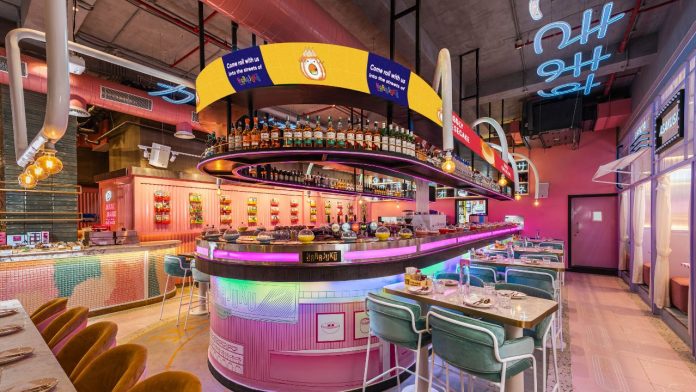Harajuku Tokyo Café, the Japanese quick-service restaurant (QSR) brand redefining the culinary landscape in India, is gearing up to raise its first funding round to fuel an ambitious expansion. With a vision to scale to 90 outlets and achieve ₹200+ crore in annual revenue by 2027, the brand is positioning itself as a frontrunner in India’s evolving food and beverage market.
“This journey has been about learning, adapting, and innovating to bring authentic yet approachable Japanese cuisine to the Indian market. By 2027, we’re targeting 90 outlets and ₹200+ crore in revenue,” said Gaurav Kanwar, Founder of Harajuku Tokyo Café.
Aggressive Expansion Plans
Harajuku Tokyo Café plans to open 15 new outlets in 2025, focusing on high-growth regions like Delhi-NCR, Mumbai, and Punjab. This will be followed by expansion into Tier 1 and Tier 2 cities such as Bangalore, Pune, Hyderabad, and Kolkata. Among its key upcoming launches is an outlet at Mumbai’s Jio World Drive, BKC, scheduled for February 2025. By December 2025, the brand aims to hit an ARR of ₹72 crore.
The café operates with a dual sales focus, achieving an impressive Average Order Value (AOV) of ₹800 to ₹1200 per person. “We’re strategically targeting new markets, including Chandigarh, Ludhiana, and Ahmedabad, to complete 15 operational outlets by the end of 2025,” Kanwar said.
The expansion strategy includes clustering multiple outlets in urban hubs, with each flagship outlet serving as a feeder for smaller QSR formats and delivery-only kitchens. This approach ensures efficiency and proximity to customers while maintaining operational control.
A Journey of Passion and Perseverance
Kanwar, a first-generation food entrepreneur, began his venture in 2019, inspired by his time in the UK and a growing passion for Japanese cuisine. “Back then, Japanese food was mostly confined to fine dining. My goal was to make it casual, accessible, and offer a more immersive experience for the Indian market,” he shared.
His transformative trip to Japan became a 40-day immersion into its culinary traditions, where he collaborated with two renowned Japanese chefs. Harajuku Tokyo Café launched its first outlet in Delhi in 2021, receiving an overwhelming response. “We were sold out every day in our first month,” Kanwar recalled.
Today, Kanwar continues to emphasize authenticity and innovation, ensuring Harajuku stands out in the crowded QSR space.
Scaling with Purpose
From a humble 580-square-foot café to a growing network of outlets across Delhi-NCR and Mumbai, Harajuku Tokyo Café has laid a strong foundation for rapid scaling. Its central kitchen in Noida plays a pivotal role in maintaining consistent quality and standardization across outlets.
“We’re operating like a Japanese McDonald’s,” Kanwar said, highlighting the brand’s ability to deliver consistent quality through a scalable, streamlined model.
The brand’s operations are built around two verticals:
● Harajuku Tokyo Café: A casual dine-in concept offering a full Japanese culinary experience.
● Harajuku Bakehouse: A scalable QSR format specializing in bakery and pastry offerings for takeaway and delivery.
These dual formats enable the brand to cater to diverse customer preferences while maximizing market penetration.
Riding Consumer Trends
The Indian palate is evolving at an unprecedented pace, driving Harajuku’s growth. “It’s amazing to see children enjoying sushi and ramen, which was unimaginable a few years ago. Japanese and Korean cuisines are set to become mainstream,” Kanwar noted.
Even smaller cities are embracing Japanese cuisine, with premiumization becoming a dominant trend. “Consumers are willing to pay for quality, and this shift isn’t confined to metros. We’re seeing widespread acceptance across Tier 2 and Tier 3 cities,” he added.
Harajuku’s menu showcases a blend of authenticity and creativity, featuring dishes like Naruto Ramen, inspired by the popular anime series Naruto, and Korean-inspired Corn Dogs, which are also iconic on Japanese streets. “The influence of manga and anime culture is immense, and India is now the second-largest consumer of manga and anime globally, after China,” Kanwar said.
The FMCG Vision
Harajuku Tokyo Café is gearing up to venture into the FMCG space, leveraging its expertise in sauces, curries, and frozen foods. “We’re working on ready-to-eat Japanese products that reflect our culinary philosophy. It’s a small step today, but we’re dreaming big,” Kanwar shared.
This initiative aligns with the brand’s long-term vision of becoming a household name in Japanese cuisine while tapping into the rapidly growing FMCG market.
A Transformative Journey Ahead
With its innovative formats, aggressive expansion plans, and deep understanding of evolving consumer tastes, Harajuku Tokyo Café is not just scaling but leading a cultural shift in India’s food scene. “We’re setting the stage for a Japanese food revolution in India, and this is just the beginning,” Kanwar concluded, brimming with confidence about the road ahead.





